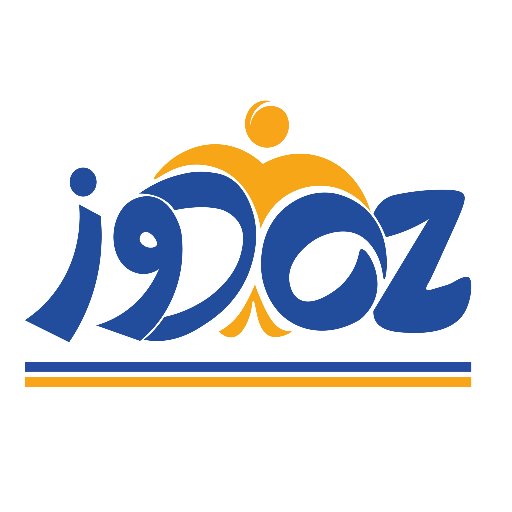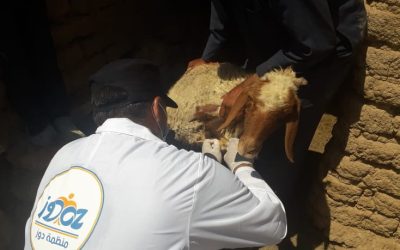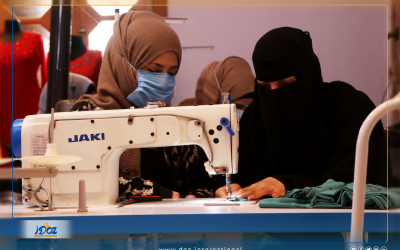Integrated Humanitarian Response for Earthquake Recovery and Resilience in Kobane, Northeast Syria

Donor and Partners
Funded by Extremadura Agency for International Development Cooperation


Project Partners: NOVACT, DOZ, UPP



Project Summary and Goal
This project’s intervention strategy focuses on enhancing human security for those impacted by the earthquake in Kobane, Northeast Syria, using a multi-sectoral approach. The plan seeks to improve access to clean water, ensure safer education environments, strengthen protections for vulnerable groups, and document and share the outcomes of these actions through research papers.
Improving Water Access
In response to the region’s severe water scarcity, key equipment for water quality testing will be upgraded across Northeastern Syria, including the areas of Jazera, Raqqa, Aleppo-Kobani, and Menbij. Portable WASH water testing kits will be deployed in Raqqa and Jazera, enabling water quality assessments in both healthcare facilities and communities when necessary. Additionally, a borehole inspection camera will be installed to assess boreholes’ conditions and identify any issues that need addressing.
Ensuring Safe Education
To promote safer education, the Al-Shaheed Sido school in Kobane, which previously accommodated 2,000 students (55% of whom are girls) and was partially damaged by the earthquake, will be restored. DOZ is collaborating with the Kobane Education Department to integrate a protection-focused approach, turning the rehabilitated school into a safer learning environment.
Establishing a Protection Center
A key part of the proposal addresses gaps exposed by the earthquake in the humanitarian response, including the absence of a protection center in Kobane district. The plan includes creating such a center to provide support in emergency camps, where internally displaced persons (IDPs) first arrive and receive psychosocial care before moving to more permanent camps or rural areas. The center will offer services such as trauma management through art, psychosocial support, and natural disaster awareness, either at the center itself or by organizing outreach activities in schools (like Al-Shaheed Sido) and rural regions.
Core Strategies
The intervention strategy relies on three key pillars:
- Empowerment: Training local authorities to enhance their capacity.
- Resilience: Supporting rehabilitation and protection measures to build resilience.
- Human Rights and Security: Promoting human security in all aspects of the intervention.
Expected Results Under This Project
The expected results of the project outlined above can be categorized according to the key areas of intervention:
1. Improved Access to Water
- Upgraded Water Testing Capacity: Essential equipment for water quality testing will be modernized, improving the ability to monitor and ensure safe water access in Raqqa, Jazera, Aleppo-Kobani, and Menbij.
- WASH Kits Deployed: Portable WASH water testing kits will be operational in both health care facilities and communities, ensuring timely and accurate water testing, leading to better health outcomes and reduced risk of waterborne diseases.
- Borehole Condition Assessed: The use of a borehole inspection camera will provide critical data, helping identify and address water infrastructure issues, improving water security in the region.
2. Safer Educational Environment
- Rehabilitation of Al-Shaheed Sido School: The school will be fully restored, providing a safer and more stable learning environment for approximately 2,000 students (55% girls), ensuring continuity of education after the earthquake.
- Integration of Protection Measures: By introducing a cross-cutting protection approach in coordination with the Kobane Education Department, the rehabilitated school will offer a safer space, reducing risks for vulnerable students and enhancing their sense of security.
3. Enhanced Protection for Vulnerable Populations
- Establishment of a Protection Center: The creation of a protection center in Kobane will fill a critical gap, offering psychosocial support and other essential services to IDPs in emergency camps. This will help address trauma, improve mental health, and provide a sense of safety and stability to displaced individuals.
- Trauma and Disaster Awareness Programs: The center will conduct sessions on trauma management using art therapy and raise awareness about natural disasters, benefiting both IDPs and the local population, with programs extending into schools and rural areas.
- Effective Response to Humanitarian Needs: The center will serve as a hub for addressing urgent needs in the district, helping IDPs and the affected population transition more smoothly into stable environments, reducing the strain on larger humanitarian organizations.
4. Long-Term Empowerment, Resilience, and Human Security
- Empowerment of Local Authorities: Through training programs, local authorities will be better equipped to manage humanitarian crises and oversee long-term recovery efforts.
- Increased Resilience: The rehabilitation of infrastructure and protection actions will build community resilience, reducing vulnerabilities in future disasters.
- Promotion of Human Rights and Human Security: The multi-sectoral interventions will enhance overall human security in Kobane and surrounding areas, improving quality of life and ensuring a more stable post-disaster recovery process.
In sum, the expected results will lead to improved access to essential services, stronger protections for vulnerable groups, safer education, and a more empowered and resilient community in Northeast Syria.
Activities This Project
——–






